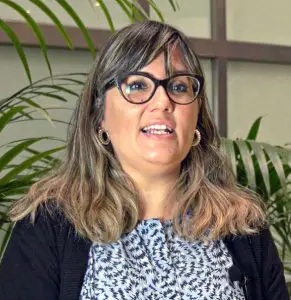SUSTAINABILITY| 26.03.2021
Sara Fernández: “We cannot have a planet covered in landfills”
 MAPFRE’s environmental specialist believes that a circular economy is the key to making the most of everything, but cultural change (which is yet to occur) is needed for this to happen. Citizens, she says, should be more aware of the impact of not reducing, recycling and reusing the waste we generate and should also understand the benefits of this production and consumption model, which prevents the depletion of natural resources, reduces carbon emissions and saves energy.
MAPFRE’s environmental specialist believes that a circular economy is the key to making the most of everything, but cultural change (which is yet to occur) is needed for this to happen. Citizens, she says, should be more aware of the impact of not reducing, recycling and reusing the waste we generate and should also understand the benefits of this production and consumption model, which prevents the depletion of natural resources, reduces carbon emissions and saves energy.
Why is waste a threat?
Forecasts predict that a total of 2.59 trillion metric tons of annual waste will be generated worldwide in 2030. This is a monstrous figure that highlights the importance of properly managing not only organic waste, but also other types of waste such as paper, plastic, glass and oil, for example. It is important to learn how to properly identify waste, recycle it and make the most out of it to give it a second or third life and, therefore, prevent it from ending up in a landfill because, clearly, we cannot have a planet covered in landfills. Waste is undoubtedly a threat. It pollutes soil and water, causes fires and generates greenhouse gases, such as CO2 and methane, which cause climate change. That is why it is so important that we all, both as citizens and businesses, do our part and strive to properly manage waste in our daily lives. It is one of the ways we can contribute to the planet’s survival.
What are the advantages of a circular economy?
A circular economy is a production and consumption system that, unlike the linear throwaway model, promotes reuse, repair and recycling. This translates into considerable energy savings compared to extractive industries (we avoid producing new materials), maximized use of scarce natural resources available, and reduced deforestation. If we think of an appliance factory, for example, this means designing each washing machine in such a way that it lasts as long as possible, is repairable and that when it reaches the end of its lifespan after many years, its materials can be reused or recycled. The threats posed by climate change show that it is more necessary than ever to make sound progress toward this green and sustainable model, which not only helps companies improve their results, reduce costs and reduce environmental impact, but could also generate 160,000 jobs in Spain by 2030. Companies must promote circularity.
What can we do in our day-to-day lives to be more circular?
I believe that we should firstly be aware of the importance of separating waste, as this is the key to making this model work and helping the circular economy to exist. I would also stress the value of responsible consumption. The pandemic has definitely helped in this regard to some extent, making us more aware that we don’t really need half of the things we buy. I also believe that we need to buy higher-quality products, which generally last longer, get rid of things that have come to the end of their lifespan, opt for second-hand, which is something that younger people have fully embraced, and, of course, shop local. It is also important to repair things more, properly separate waste, use recycling points more, measure energy and water consumption at home, avoid water pollution, air pollution and even sound pollution, and, of course, opt for renewable energy sources. These are just some examples.
“Waste is a threat. It pollutes, causes fires and generates greenhouse gases, which cause climate change.”
Which sectors are the most progressive with regard to the circular economy?
Hospitality is clearly the most active sector, the sector implementing the most initiatives to prevent waste production and encourage recycling, the sector involving its employees the most, which is a key part, and the sector working with more environmentally certified suppliers. This is shown in a report that we have just produced together with the Spanish Chamber of Commerce, which reveals that almost half of bars and restaurants separate organic matter from other types of waste. Doing this prevents it from being broken down into the environment and polluting it. The report also shows bars and restaurants that are eliminating most single-use plastics (33 percent), those that are getting behind deposit and return systems (20 percent) and those that have implemented more initiatives to promote energy efficiency.
Are SMEs on board with the circular economy?
Although there is still a long road ahead, I think we are making good progress. The fact that half of Spanish SMEs are already aware of the advantages of the circular economy is proof of this, though this figure varies depending on the sector of activity and improves as the size of the company grows. According to the latest data, more and more companies are taking steps to reduce waste generation, selling or handing over their waste to other companies for use, more and more companies are separating some or all of the waste they generate at source, especially paper and plastics, and using recycled raw materials in their production processes. In terms of areas for improvement, I would highlight the fact that many of them still do not take eco-designs into account when developing their products, which is a key aspect in increasing the recycling rate. They also do not eliminate single-use plastics as much as we would hope and, with the exception of the industrial sector, they do not make a special effort to recover and reuse water.
“A circular economy saves energy, leverages scarce natural resources and reduces deforestation.”
How can MAPFRE help companies to recycle more and use resources more responsibly?
At the start of the year MAPFRE signed an agreement with the Spanish Chamber of Commerce with the aim of providing advice and training to small- and medium-sized enterprises in the circular economy. This is something we certainly believe will contribute to improving their competitive edge and, of course, the sustainability of the Spanish business sector. Thanks to this collaboration, SMEs will be able to calculate their carbon footprint through a specific tool that will also enable them to assess their energy efficiency and the extent to which the circular economy has been implemented in their organization.
Do you want to be a benchmark in the circular economy? How are you achieving it?
This is essentially a challenge that we have included in our sustainability strategy along with 30 other objectives, which will enable us to combat global challenges, such as the climate emergency or inequality, for example. In this sense, the company has committed itself to minimizing waste generation (paper, plastic, cardboard, electronic equipment, etc.) throughout the Group, and to achieving Zero Waste Certification at the Majadahonda complex (Madrid) by the end of next year. The MAPFRE Sin Plástico (Plastic-free MAPFRE) project, in which 80 percent of employees in Spain and Portugal participated in 2019, is particularly noteworthy. The project has successfully prevented the consumption of 1.5 million plastic bottles and 2 million single-use cups. More recently, we have joined the Pact for a Circular Economy, an initiative that sets out nine commitments to promote energy saving across the company, reduce our environmental impact, measure waste and efficiency in the company, promote products and services that meet environmental criteria and that help to reduce our carbon footprint, and involve society by promoting a model of responsible consumption and high-quality recycling, among other measures.

